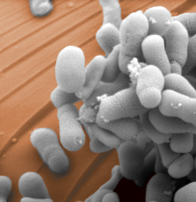Methylosinus trichosporium: Difference between revisions
No edit summary |
No edit summary |
||
| Line 22: | Line 22: | ||
[[File:Phylogenetic-Analysis-of-the-16S-rDNA-from-Methylosinus-trichosporium-IMV-3011-The-tree.png]]. | [[File:Phylogenetic-Analysis-of-the-16S-rDNA-from-Methylosinus-trichosporium-IMV-3011-The-tree.png]]. | ||
=Genome structure= | =Genome structure= | ||
| Line 29: | Line 28: | ||
=Ecology and Pathogenesis= | =Ecology and Pathogenesis= | ||
"Methylosinus trichosporium" has been found in various areas such as Soil, fresh water sediments, groundwater. )Whittenbury et al., 1970b) (Bowman et al., 1993) (Stein et al., 2010) | "Methylosinus trichosporium" has been found in various areas such as Soil, fresh water sediments, groundwater. )Whittenbury et al., 1970b) (Bowman et al., 1993) (Stein et al., 2010) | ||
[[File:Screen Shot 2023-04-28 at 10.19.42 PM.png|200px|thumb|left|alt text]] | |||
=Current Research= | =Current Research= | ||
Revision as of 02:28, 29 April 2023
Classification
Domain:Bacteria
Phylum: Pseudomonadota
Class: Alphaproteobacteria
Order: Hyphomicrobiales
Family: Methylocystaceae
Genus: Methylosinus
Species
Methylosinus trichosporium (strain ATCC35070)
Description and significance
"Methylosinus trichosporium" is a gram negative, aerobic bacteria. Trichosporium is a bacteria that relies on methane as a source of carbon and energy. This bacteria not only helps by consuming and getting rid of methane it also serves another purpose as it has shown the ability to degrades Trichloroethylene and cometabolism of polyhydroxybutyrate. Trichloroethylene a chemical that is toxic to aquatic life, plants and animals. ("Methylosinus trichosporium". wikipedia the free encyclopedia https://en.wikipedia.org/wiki/Methylosinus_trichosporium)
16S Ribosomal RNA Gene Information
Methylosinus trichosporium is a species of a-proteobacteria in the family Methylocystaceae. ("Methylosinus trichosporium". national library of medicine https://www.ncbi.nlm.nih.gov/data-hub/taxonomy/426/)
.
Genome structure
The genome structure methylosinus trichosporium was sequenced, assembled, and annotated by the U.S. Department of Energy Joint Genome Institut. 44 contigs and 9 scaffolds was assembled from Roche 454-FLX, 454-std, 454-Titanium PE, and Illumina Solexa reads using Velvet (21). Automatic annotation was done using the Prokaryotic Dynamic Programming Genefinding Algorithm. Genome is 4.9 Mbp in size, contains 66% G+C, and encodes a single rRNA operon (Vallenet, D., S. Engelen, D. Mornico, S. Cruveiller, L. Fleury, A. Lajus, Z. Rouy, D. Roche, G. Salvignol, C. Scarpelli, and C. Medigue et al., 2009)
Ecology and Pathogenesis
"Methylosinus trichosporium" has been found in various areas such as Soil, fresh water sediments, groundwater. )Whittenbury et al., 1970b) (Bowman et al., 1993) (Stein et al., 2010)
Current Research
Current research is underway for "Methylosinus trichosporium" it is currently being studied for multiple things such as methane assimilation, copper accumulation, and metal-dependent gene expression. Recent interest in methanotroph metabolic engineering has led to new protocols for genetic manipulation of methanotrophs that are effective and simple to use. "Methylosinus trichosporium" has shown to express both sMMO and pMMO, methanobactin (Dassama et al.,2017) and can express two distinct MDHs, the calcium-binding MxaF and the lanthanide-binding XoxF (Haque. Kalidass, et al., 2015).
References
https://www.frontiersin.org/articles/10.3389/fmicb.2013.00040/full#h10=Author=
https://en.wikipedia.org/wiki/Methylosinus_trichosporium#:~:text=Methylosinus%20trichosporium%20is%20an%20obligate,ability%20to%20oxidize%20methane%2C%20M.
https://www.ncbi.nlm.nih.gov/pmc/articles/PMC6010078/, Soo Y, and Amy C Rosenzweig. “Recent Advances in the Genetic Manipulation of Methylosinus trichosporium OB3b.” Methods in enzymology vol. 605 (2018): 335-349. doi:10.1016/bs.mie.2018.02.011
https://pubmed.ncbi.nlm.nih.gov/29909832/, Soo Y, and Amy C Rosenzweig. “Recent Advances in the Genetic Manipulation of Methylosinus trichosporium OB3b.” Methods in enzymology vol. 605 (2018): 335-349. doi:10.1016/bs.mie.2018.02.011
Stein, L., Yoon, S., Semrau, J. D., Dispirito, A. A., Crombie, A., Murrell, J. C., Vauilleumier, S., Kalyuzhnaya, M. G., OP den camp, H. J., Bringer, G., D.Bruce, Cheng, J.-F., Copeland, A., Goodwin, L., Han, S., Hauser, L., Jetten, M. S. m., Lajus, A., Land, M. L., … Klotz, M. G. (2010, December 15). Journal of bacteriology. Journal of Bacteriology. Retrieved April 28, 2023, from https://journals.asm.org/doi/10.1128/JB.00144-06
Vallenet, D., S. Engelen, D. Mornico, S. Cruveiller, L. Fleury, A. Lajus, Z. Rouy, D. Roche, G. Salvignol, C. Scarpelli, and C. Medigue. 25 November 2009. MicroScope: a platform for microbial genome annotation and comparative genomics. Database (Oxford) 2009 :bap021.


